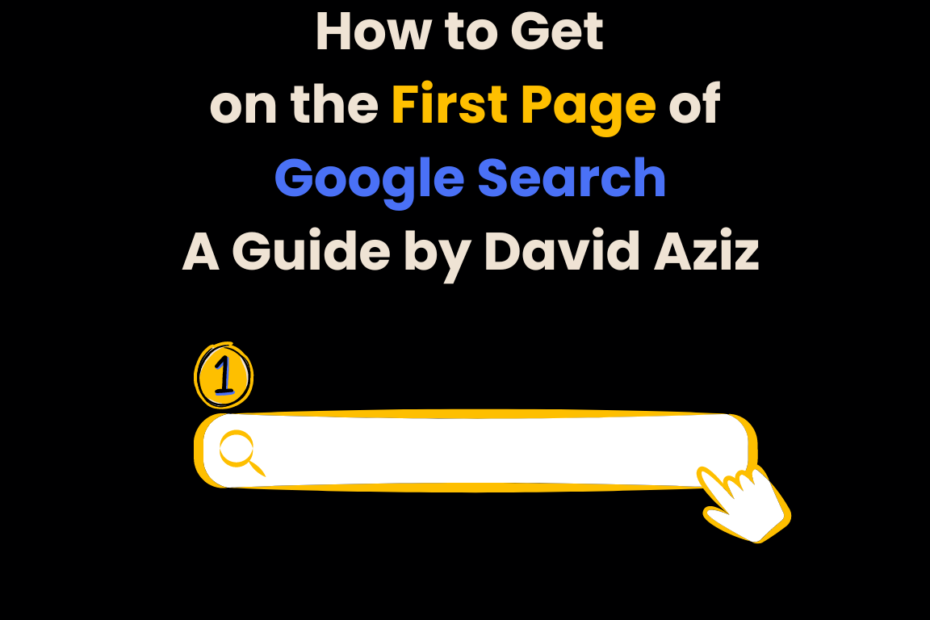Introduction
Getting your website to the first page of Google search results is crucial for online visibility and traffic. With millions of websites competing for attention, mastering SEO (Search Engine Optimization) techniques can significantly enhance your chances of ranking high. In this article, we will explore effective strategies to boost your website’s ranking, using insights from SEO expert David Aziz.

Table of Contents
- Understanding SEO
- Importance of Keywords
- On-Page SEO Techniques
- Off-Page SEO Strategies
- Content Creation and Marketing
- Technical SEO
- User Experience (UX)
- Tools for SEO
- Common SEO Mistakes to Avoid
- Conclusion
- FAQ Section
1. Understanding SEO
SEO is the practice of optimizing your website to rank higher in search engine results. It involves various techniques and strategies aimed at increasing the quality and quantity of traffic to your website.
Table 1: SEO Components
| Component | Description |
|---|---|
| On-Page SEO | Optimizing content and HTML source code |
| Off-Page SEO | Building backlinks and social media presence |
| Technical SEO | Improving site speed, mobile-friendliness |
2. Importance of Keywords
Keywords are the terms and phrases users type into search engines. Identifying the right keywords is vital for SEO success. Use tools like Google Keyword Planner or SEMrush to find relevant keywords for your niche.
Tips for Keyword Research:
- Focus on long-tail keywords (e.g., “how to get on the first page of Google”)
- Analyze competitors’ keywords
- Use variations and synonyms of your main keywords
3. On-Page SEO Techniques
On-page SEO refers to optimizing individual web pages to rank higher. Here are essential techniques:
- Title Tags: Include your primary keyword in the title tag.
- Meta Descriptions: Write compelling meta descriptions with keywords to encourage clicks.
- Header Tags (H1, H2, H3): Use header tags to structure your content and include keywords.
- Image Optimization: Use descriptive file names and alt tags for images.

Table 2: On-Page SEO Checklist
| Technique | Description |
|---|---|
| Title Tags | Include primary keywords |
| Meta Descriptions | Create engaging summaries |
| Header Tags | Organize content with keyword-rich headers |
| Internal Linking | Link to other pages on your site |
4. Off-Page SEO Strategies
Off-page SEO involves activities outside your website to improve its authority and ranking. Key strategies include:
- Backlinks: Acquire quality backlinks from reputable websites.
- Social Media Marketing: Share content on social media platforms to increase visibility.
- Guest Blogging: Write articles for other blogs to gain backlinks and exposure.
5. Content Creation and Marketing
High-quality content is critical for SEO. Focus on creating informative, engaging, and original content.
Tips for Effective Content Marketing:
- Use visuals (images, videos) to enhance engagement.
- Update old content to keep it relevant.
- Promote content through social media and email marketing.
6. Technical SEO
Technical SEO ensures that search engines can crawl and index your website effectively. Important aspects include:
- Site Speed: Optimize your site for faster loading times.
- Mobile-Friendliness: Ensure your website is responsive and user-friendly on mobile devices.
- XML Sitemap: Create and submit a sitemap to search engines.
7. User Experience (UX)
A positive user experience can significantly impact your SEO ranking. Factors to consider:
- Navigation: Ensure easy navigation for users.
- Content Readability: Use clear fonts and formatting for easy reading.
- Engagement: Encourage user interaction through comments and feedback.
8. Tools for SEO
Utilizing the right tools can streamline your SEO efforts. Here are some essential tools:
- Google Analytics: Track website traffic and user behavior.
- Google Search Console: Monitor your website’s performance and indexing.
- Ahrefs: Analyze backlinks and keyword rankings.

Table 3: Recommended SEO Tools
| Tool | Purpose |
|---|---|
| Google Analytics | Website traffic analysis |
| Google Search Console | Performance tracking |
| Ahrefs | Backlink and keyword analysis |
9. Common SEO Mistakes to Avoid
Avoid these common pitfalls that can hinder your SEO efforts:
- Keyword stuffing: Overusing keywords can lead to penalties.
- Ignoring mobile optimization: A significant portion of traffic comes from mobile devices.
- Neglecting analytics: Failing to monitor your website’s performance can result in missed opportunities.
FAQs
1. How long does it take to rank on Google?
It can take anywhere from a few weeks to several months, depending on competition and the effectiveness of your SEO strategies.
2. Can I do SEO myself?
Yes, with the right knowledge and tools, you can implement SEO strategies on your own.
3. What is the most important factor for SEO?
Content quality is often considered the most important factor, but technical SEO and backlinks also play significant roles.
4. How often should I update my content?
Regularly updating content, ideally every few months, can help maintain relevance and improve SEO rankings.
Conclusion
Getting on the first page of Google search results is achievable with the right strategies and consistent effort. By understanding SEO principles, utilizing effective techniques, and continually optimizing your website, you can enhance your online visibility and drive traffic. Remember to stay updated on SEO trends and algorithm changes to maintain your rankings.
